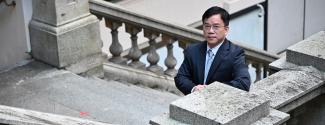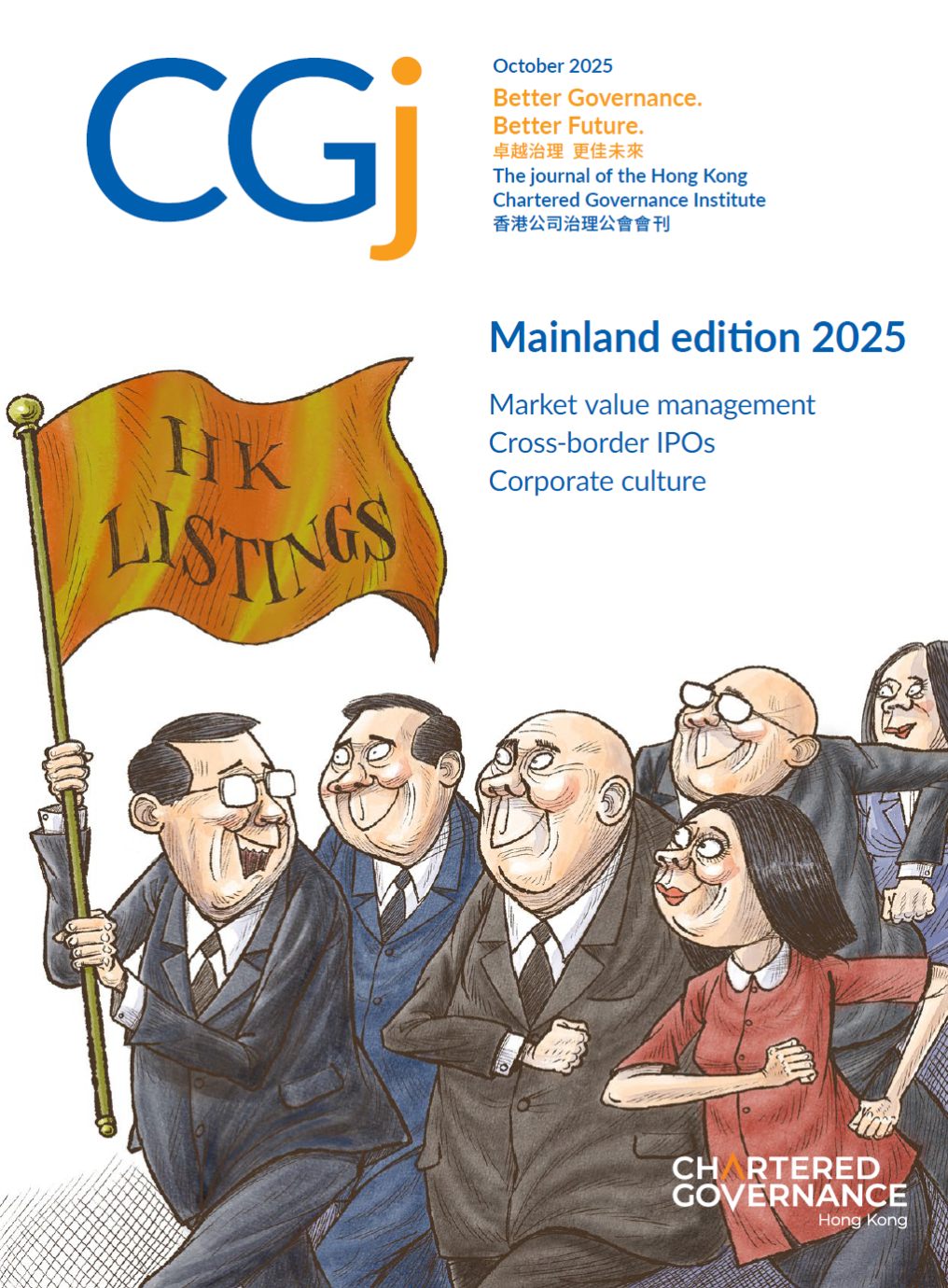This month’s interview – the final one in the GoldenGen Reflections series – is with Richard Leung JP FCG HKFCG, Institute Past President, and Barrister-at-Law, Des Voeux Chambers
When did you first join the Institute and what was your professional role at that time?
‘I first became involved with the Institute in 1982 while studying for a Professional Diploma in Company Secretaryship and Administration with what is now The Hong Kong Polytechnic University. After graduating in 1985, I secured my first job as a management accountant at a shipping company. I then took a master’s degree in accounting and finance in the UK in 1987, after which I worked as a management consultant, accounting manager and financial controller. I became an Associate of the Institute in 1990 and a Fellow in 1995.
Whilst working, I began studying law on a part-time basis from 1990, qualifying as a barrister in the UK and Hong Kong in 1994. During my decades practicing as a barrister here, I specialised in company law and have conducted a number of high-profile trials involving corporate fraud and scandals.’
Did membership of the Institute support your career development, and if so, in what ways?
‘Joining the Institute helped me find my first job, which was a very direct and tangible benefit – the Institute’s professional qualification programme is highly regarded and carries considerable weight in the job market. In addition, my training provided me with a cross-disciplinary knowledge base, spanning accounting, management, administration and law, meaning I was not restricted to a single professional area. You might start out as an engineer, for example, but, once you’ve obtained the Institute’s qualification, you can transition into senior management or become a governance specialist. The broad sweep of knowledge acquired is invaluable, offering distinct advantages both for progression to the upper levels of corporate leadership and for those wishing to switch or progress in their careers.’
What would you say are some of the pivotal moments in the Institute’s development over the years?
‘Looking back, there have been several key moments that were particularly important. The first was the inaugural Corporate Governance Conference in 1998, which propelled the concept of governance into public view, significantly enhancing the Institute’s standing within the professional community and establishing it as a thought leader in the field.
Another milestone was gaining professional recognition. I represented the Institute in lobbying the Official Receiver’s Office, ultimately achieving a breakthrough whereby members were permitted to tender for liquidation work. This was important because liquidation work is not solely about financial reporting – it also requires an understanding of legal procedures. Governance professionals are uniquely positioned with a blend of those skills.
Lastly, starting in 2006, I introduced activities such as dragon boat races and social gatherings to raise the Institute’s profile and influence. These pursuits not only strengthened connections among members but also helped establish a clearer and more visible professional identity for the Institute within the widter community.
Together, these pivotal moments intertwined to drive the Institute’s growth to the scale and stature it enjoys today.’
How has the changing governance landscape affected the legal profession since you joined the Bar?
‘The evolution of corporate governance is closely linked with enterprise risk management. In the past, it was only when a company experienced a major failure or scandal that people would start asking why no one had identified the problem earlier. Today, with the growing maturity of corporate governance and ESG concepts, the governance professional role has changed noticeably.
The focus is now much more on prevention and risk management. Governance advisers are increasingly involved in the design of internal controls, compliance systems and risk assessments. Their role is no longer limited to resolving issues after the fact, but now centres on identifying potential risks in advance and preventing the company from falling into major crises.’
You are actively involved in public service. What can you tell us about the part played by governance in terms of your appointments?
‘Governance issues abound in public service. For instance, during my time on the Board of Review (Inland Revenue Ordinance), I handled cases involving tax fraud and penalties. These cases were not only about the accuracy of financial information but also about evaluating the internal controls and compliance systems of government bodies, ensuring that the tax system operates fairly and transparently.
While serving on the Appeal Board for the Hotel and Guesthouse Accommodation Authority, I dealt with the problem of shadow guesthouses, which are unlicensed establishments that often failed to meet fire safety and other essential building standards, posing a danger to both guests and the community. It was essential to ensure that the regulatory framework was robust and that enforcement agencies could act effectively, with accountability for those responsible, in order to protect public safety.
In addition, at the Financial Dispute Resolution Centre, I was involved in handling disputes between banks, securities firms and clients, particularly cases related to the misselling of investment products.’
What advice would you give to the younger generation starting out on their governance careers?
‘There is strong growth potential for this career. As legal, compliance and risk management requirements increase, demand for governance professionals is rising. Also, governance work is less likely to be replaced by AI as it requires human judgement and a deep understanding of laws and systems. I would certainly encourage young people to pursue a governance qualification. Whether you are an accountant, lawyer or other professional, this can open up career options beyond the traditional roles of company secretary or corporate service provider to include investor relations, compliance and risk management. Corporate governance offers a stable career with the opportunity to shape how companies and society operate.’
corporate governance offers a stable career with the opportunity to shape how companies and society operate
Richard Leung JP FCG HKFCG
Institute Past President, and Barrister-at-Law, Des Voeux Chambers
本月的专访,也是睿思智享系列的最后一篇,对象是梁伟强大律师JP FCG HKFCG,公会前会长, 现职德辅大律师事务所。
您是什么时候加入公会的?当时您的专业身份是什么?
‘我在1982年首次接触公会,当时我正在香港理工大学的前身香港理工学院修读公司秘书及行政管理高级文凭课程。1985年毕业后,我找到第一份在航运公司的管理顾问工作。1987年到英国修读会计及财务硕士课程,其后任职管理会计、会计经理和财务总监。1990年成为公会会士, 并于1995年成为资深会士。
在职期间,我由1990年开始兼读法律课程,并于1994年在英国和香港取得大律师资格。在香港执业数十年间,专长是公司法,曾参与多项广受关注的、牵涉公司欺诈和丑闻的审讯。’
公会的会员资格是否有助于您的职业发展?如果有,在哪些方面?
‘加入公会帮助我找到第一份工作,这是非常直接且实在的帮助,公会的专业资格课程在业界享有很高的声誉, 在就业市场上分量十足。另外,这段培训让我具备跨学科的知识背景,包含会计、管理、行政、法律等范畴,令我不局限于单一的专业领域。举例来说,你可能最初当工程师,但一旦取得公会的专业资格,就可以转型进入高层管理,或成为一名治理专家。这种广泛的知识积累极为宝贵,不仅有助于晋升至企业领导层的更高职位,也为想要转换职业道路的人带来显著优势。’
您认为公会历史上有哪些重要的里程碑?
‘回顾过去,有几个关键时刻对公会的发展特别重要。第一个是1998年举办的首届公司治理研讨会,这场会议将公司治理的概念推向公众视野,大大提升了公会在专业社群中的地位,并奠定了公会作为思想领袖的基础。
另一个里程碑是争取专业认可。我曾代表公会向破产管理署倡议,最终取得突破,成功争取让公会会员能够参与清盘工作的投标。这一点意义重大,因为清盘工作不只是财务报告,更需要理解法律程序,而公司治理专才兼具這些技能,具备独特优势,能够胜任此类工作。
最后,2006年开始我透过举办龙舟赛、社交聚会等活动,提升公会的知名度和影响力。这些举措不仅加强了会员之间的联系,也让公会在更广泛的社群中建立起鲜明的专业形象。 这些重要时刻相互交织,共同推动了公会成长,达至今天的规模与成就。’
随着公司治理理念的发展,法律行业出现了哪些变化?
‘公司治理的发展过程,与企业风险管理息息相关。以往, 只有当企业发生重大失误或丑闻时,大家才会追问为什么没有人及早发现问题。如今,随着公司治理、ESG 等概念的成熟,治理专业人士在企业内的角色也有明显转变。
现在更强调预防和风险管理,法律顾问日益需要参与设计企业的内部控制、合规制度,及从事风险评估。这不仅是处理事后问题,更是提前识别潜在风险,防止企业陷入重大危机。’
您积极参与公共服务,能否分享治理议题在其中扮演的角色?
‘治理议题在公共服务中无处不在。我曾在税务上诉委员会服务,处理过涉及税务欺诈和罚款的案件。这类案件不仅关乎财务资料的真实性,更牵涉评核政府机构的内部控制和合规制度,确保税务系统能在公平、透明的基础上运作。
在旅馆业上诉委员会的工作中,我曾经面对过无牌宾馆的问题。这些无牌场所,通常未达到消防及基本的建筑物安全标准,对住客与社区都构成潜在危险。我们必须确保监管制度完善,让执法部门能有效执行,并追究相关责任,以保障公众的安全。
此外,我也曾在金融纠纷调解中心服务,处理银行、证券行与客户之间的纠纷,尤其是有关误导销售投资产品的案件。’
您对刚刚开始治理生涯的年轻一代有什么建议?
‘这个行业的发展空间很大。随着法律、合规及风险管理等方面的要求日增,市场对治理专才的需求也不断增加。另外,治理专业不易被AI取代。许多合规和治理工作,仍需专业人员理解法律和制度框架,并作出判断。 我鼓励年轻人修读治理相关的专业资格。无论你是会计师、律师或其他专业人士,这个资格都能扩大你的职业选择范围,不仅限于公司秘书或公司服务提供商的传统角色,也可以参与投资者关系、合规管理、风险控制等范畴。治理专业提供一份稳定的职业,并让你有机会影响企业和社会的运作。’
治理专业提供一份稳定的职业,并让你有机会影响企业和社会的运作
梁伟强大律师JP FCG HKFCG
公会前会长, 德辅大律师事务所



